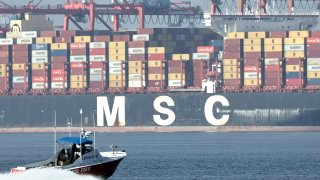
LONG BEACH, CALIFORNIA – DECEMBER 04: A Long Beach Fire Department boat passes shipping containers stacked on a container ship at the Port of Long Beach on December 4, 2024 in Long Beach, California. U.S. President-elect Donald Trump is threatening new tariffs on multiple countries as his second term approaches after making tariffs a signature of his 2024 Presidential campaign. The ports of Los Angeles and neighboring Long Beach is the country’s busiest container port complex. (Photo by Mario Tama/Getty Images)
The Port of Los Angeles announced a new $31 million grant Thursday to test new reduced emission technology.
The project, in partnership with the Catalina Express and Harbor Breeze Cruises, will test new renewable diesel-powered and electric-powered boats.
In partnership with @CatalinaExpress and @HarborBreezeC, the Port of Los Angeles will soon begin emission-reduction technology demonstration projects for specialized harbor craft, thanks to a $31 million grant awarded by @AirResources . https://t.co/VrsGH5LciN pic.twitter.com/iVUpvhSRQQ
— Port of Los Angeles (@PortofLA) January 16, 2025
Among the new projects, port leadership hopes to produce "the design, construction and launch of a passenger ferry with Tier 4 engines and potentially a CARB-verified, U.S. Coast Guard-approved diesel particulate filter."
Get top local stories in Southern California delivered to you every morning. Sign up for NBC LA's News Headlines newsletter.
Tier 4 engines, originally introduced in 2008, follow some of the most stringent emissions guidelines among commercial engines for nitrogen oxide, hydrocarbon, carbon dioxide, and particulate matter emissions.
Particulate matter and nitrogen oxide must be reduced by about 90% compared to lower tier engines to pass testing.
The Catalina Express intends to adopt and adapt the new motor to replace three Tier 2 and Tier 3 engines in their smaller ferries.
Two zero-emission boats are also planned as a part of the "LA MER" project in partnership with Harbor Breeze Cruises. The newly developed vessels intend to exceed current zero emission testing standards within their class and will be operable a minimum of 30% of the time in zero-emission mode. Some trips are anticipated upwards of 100%.
LA MER is one part of California Climate Investments, a statewide initiative to reduce greenhouse gas emissions for disadvantaged communities.
Additional electric powertrains for tugs, ferries and pilot boats operating in the San Pedro Bay will also be studied.
Catalina Express and Harbor Breeze Cruises will each contribute a $15 million match toward their respective demonstration program.
The Port of Long Beach will contribute an additional $340,000 to support the Port of Los Angeles.



